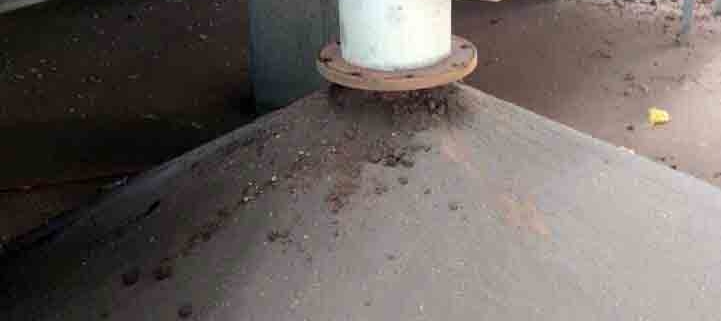Lignosulfonate, also known as sulfonated lignin, is a by-product of sulfite process paper pulp and can be used as concrete water reducer, refractory material, ceramics, etc. Precipitating agent such as lime, calcium chloride or basic lead acetate is obtained by a process such as precipitation, separation and drying. This week, I will share with you the lignosulfonate product obtained by drying it through drying equipment and its use.
First, the dispersant for making coal water slurry In the industrial preparation of coal water slurry, a certain amount of additives must be added to mix the coal powder and water into a suspension, thereby having good stability and fluidity. Additives include two major categories of dispersants and stabilizers. At present, the domestic industrial coal slurry is naphthalene sulfonate (code 2024), the price is about 4500~5000 yuan / ton, the cost of dispersant per ton of coal water slurry is about 45~5 yuan due to the high cost of dispersant, the impact Development and promotion of coal water slurry industry. The lignosulfonate extracted by the black liquor of papermaking has good dispersibility and stability. After modification, it can be made into a dispersing agent and a stabilizer for coal water slurry, and the cost per ton of coal slurry is about 31 yuan. Lignosulfonate is cheap, and the current price is about 1500~2000 yuan/ton. Instead of naphthalene sulfonate, it can reduce the cost of coal water slurry.
Second, the use of water reducing agent in the production of cement water reducing agent cement can improve the quality of concrete and reduce the amount of cement. Lignosulfonate products can be used to make good water reducing agents. The active group on the alkali lignin benzene ring in the black liquor can be chemically modified to obtain a water-reducing agent with good performance. The most common method is the sulfonation method to produce a lignosulfonate product. An anionic surfactant with semi-colloidal properties that can produce monolayer adsorption at the interface. When the sulfonate product is incorporated into the cement slurry, it can promote the dispersion of the cement particles and release the moisture contained in the gel. The free water is increased to increase the fluidity and retardation of the cement slurry, and the product has a good water reducing effect at a low incorporation amount. The sulfonation process can be carried out in a special reaction tank before entering the drying tower and then dried to obtain a lignosulfonate product.
Third, the granulation of binders and metal ore fines used in industrial briquette production. The boiled industrial coal includes boiler briquette and gasified briquette, that is, pulverized coal and powder coke. The pulverized coal (coke) is added to the binder and cold-formed to produce boiler briquette and industrial briquette for gasification. The boiler briquette is tested in a 4T/hour boiler, the total suspended solids (TSP) is reduced by 80%, the thermal efficiency is increased by 20%~25%, the industrialized burning of gasified coal (coke), the furnace condition is normal, and the gas composition The calorific value and gas production are equivalent to the corresponding lump coal (coke), which can be used as a gas generator for fertilizer, metallurgy and machinery industries. Due to the increasing degree of mechanization of coal mining in China, the amount of coal powder produced during the coal mining process is increasing, causing the long-term backlog of pulverized coal to be untreated. The use of briquette technology can not only alleviate the contradiction between supply and demand of lump coal, but also fully utilize coal resources, and its market prospect is broad.
In addition, metallurgical vertical tank zinc smelting and the like use concentrated black liquor as a binder, but liquid transportation is inconvenient. If the black liquor is made into a lignosulfonate, it is easy to transport and more convenient to use.
Fourth, the alkali lignin extracted from the alkali-pulping black liquor extracted by the petroleum extraction aid is reacted with phenol to obtain a lignin phenolic resin, which is then compounded with a saponified product obtained by hydrolysis of oil to form a paste. Dark brown oily water coagulant. The product is an excellent emulsifier and surfactant, which can be used as a cleaning agent for oil pipelines, a heavy oil viscosity reducer for oil field production and water injection emulsification to increase oil recovery.
Fifth, the lignin sulfonate product used for the production of straw feed has a certain alkalinity and contains a large amount of polypentose, and the polypentose is the nutrient component required by the livestock, and its chemical composition conforms to the feed hygiene standard (GB13078-9C). ), can be used as a straw feed admixture. Lignosulfonate is a resource-based product for treating papermaking waste liquid, which is cheap, and the technology of composite processing of straw with lignosulfonate and urea is simple and the technology is easy to grasp. The use of lignosulfonate to alkalinize straw as a feed has obvious advantages over ordinary ammoniated straw and other ammoniated straws in improving the digestibility of livestock and increasing nutritional value.
Sixth, the production of asphalt emulsifier utilizes lignosulfonate as a basic raw material, and can be processed into LCO-1 asphalt emulsifier. The technical index of the emulsifier fully meets the requirements of domestic commonly used asphalt emulsifier, and Compared with similar products, the production cost is low, about 1/3~1 / 2 of the price of other products, and it can improve the performance of asphalt, and is suitable for the inferior asphalt with high wax content, so that the ductility is improved. The asphalt emulsion produced by the emulsifier can withstand high temperature of 100 ° C, has good storage stability, and has a stable period of up to half a year, and can better meet the construction requirements. This emulsifier is not only suitable for asphalt operations in construction projects such as roads and railways, but also a good waterproof, anti-seepage and anti-corrosion agent. It can be used for waterproofing, leak-proof coating and wood anti-corrosion of houses and buildings.
Seventh, the product used as the water treatment agent for the black liquor extraction by alkali method contains a large amount of alkali lignin, which has the property of anionic polymer coagulant, has good reactivity, and is easy to destabilize under acidic conditions, and has agglomeration characteristics. It is especially suitable for the treatment of acidic wastewater. Alkali lignin is an effective coagulant for charged proteins, bacteria, dyes and other colloids and suspensions in acidic wastewater.
Eighth, other uses of the water solubility and surface activity of lignosulfonate products, can be used as a release agent for building components, and also used in refractory production and sand molding operations. It can be used as a flotation agent for metal ore beneficiation operations by utilizing its surface activity and adsorption properties. The use of lignin contains a variety of living genes, which are slowly degraded by soil organisms in the soil and converted into humic substances. Lignosulfonate products can be used as fertilizer additives. For ammonium lignin products extracted from black liquor by cooking with ammonium sulfite, because it contains more than 5% organic potassium, more than 7% of nitrogen, the product humus content is as high as 84%, and can be compounded with other fertilizers. Produce high-efficiency compound fertilizer. Lignin powder is widely used as a pesticide dispersant, a nitrogen fertilizer slow release agent, a phosphate fertilizer to produce a grinding aid, and a wood binder.



